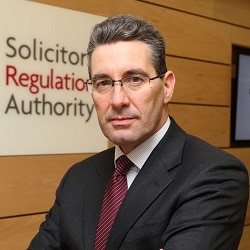
Philip: Interventions unprecedented
Solicitors were yesterday warned to brace for a “radical” increase in their contributions to the SRA Compensation Fund following the interventions into Axiom Ince, Metamorph and Kingly.
Paul Philip, chief executive of the Solicitors Regulation Authority (SRA), said they were the largest interventions in the profession’s history and left the regulator considering whether the current client protection arrangements were fit for the future.
Kingly, with 16 offices, was shut down in 2020, followed by nine-firm consolidator Metamorph in late 2022 and early 2023, and most recently Axiom Ince, with its chief executive admitting that £64m was missing from client account.
The compensation fund is a discretionary fund of last resort that can pay out up to £2m where a solicitor has stolen or not accounted for client money – and it is not covered by the firm’s professional indemnity insurance – or did not have insurance in place.
The SRA said in April that the fund had already made £1.4m in emergency payments to clients of Metamorph.
As part of their practising fees every October, law firms currently pay £660 towards the fund, plus £30 per solicitor.
Briefing the media, Mr Philip said it was too early to say how much of the £64m would fall on the fund – some will be covered by Axiom Ince’s insurance, for example, while SRA rules prevent corporate clients from claiming – but it was likely to exceed the £18m currently held in reserves.
It also raised a cash flow issue for the fund as it could take years to recoup money, such as through subrogated claims against the insurers.
He said that “based on what we know, the cost [of the fund] is going up quite radically”.
The SRA board is still considering whether it can wait until next year’s autumn renewal to collect the increased contributions or instead have to make an unprecedented mid-year call on the profession to bolster the reserves.
An alternative would be to invoke a statutory cap of £5m on all claims arising out of Axiom Ince, but while this would be good for the profession financially, Mr Philip cautioned that it risked damaging solicitors’ reputation.
“It could mean that an awful lot of people would lose an awful lot of money and actually we believe that a key part of our purpose is to drive confidence and trust in the profession. We don’t see how that possibly could.”
The fund’s reserve level is set at £27m but the costs of interventions and SRA staff time come out of that and Mr Philip said £9m had recently been paid over. Plus the administrative costs of the Axiom Ince intervention alone are £10-15m.
He added that the SRA had deliberately reduced the reserves from around £56m five years ago after an expected flood of claims arising from fraudulent investment schemes failed to materialise because insurance ended up covering them.
Hitherto, the compensation fund has mainly been there for clients of small firms but these three interventions showed that “the game has changed”, the regulator went on.
“[They] are wholly unprecedented and present a risk to reputation of the profession and the trust and confidence in the profession, and a risk to the viability of the compensation fund, so much so that we think we will need to do quite a large piece of policy work to consider whether or not we’ve got the balance right between consumer protection and the cost to the profession.”
Mr Philip said a further concern was the risk of another major intervention.
“If we have another really big claim in five months’ time, that makes it a bigger deal. This size of interventions means the regulatory framework needs a root-and-branch review.”
He insisted that the SRA was not, as some critics have suggested, ‘asleep at the wheel’ when Axiom DWFM first bought Ince and then Plexus Law out of administration in short order, both firms far larger than it was.
“We did everything we were supposed to do within the regulatory framework,” he said.
He noted how, when he joined the SRA a decade ago, it was being criticised for stepping in too quickly when there were concerns about firms’ financial stability.
Recent events have led the SRA to ask what else it could do with consolidator firms like the three under the spotlight, that have grown rapidly through acquisition.
The SRA could target them with inspections, Mr Philip said, “but we’re not external auditors and we scratch our head about what level of comfort we could give ourselves”.
Such a move might also require a significant expansion in staff and skill base, which ultimately would be loaded onto practicing fees.
He added that, in the year to 30 June, the SRA had recorded 114 mergers and acquisitions. “If we were to take more proactive before-the-event action [to check them], it would be a tonne of work,” he said, again increasing the cost of the regulation.












Leave a Comment